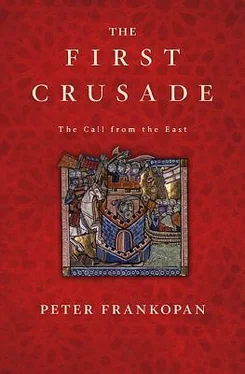A more effective response had been organised by the time Peter the Hermit himself arrived at the Byzantine frontier at the end of May 1096. Leo Nikerites, a man promoted in the wake of the Diogenes conspiracy, treated the contingent with diligence and care: according to one account, Peter the Hermit and those travelling with him received everything they asked for – all their requests were to be granted, as long as they behaved well. 15Nevertheless, frequent trouble accompanied the various strands of the People’s Crusade as it snaked towards Constantinople. Towns in Byzantium’s western provinces were regularly assaulted and the local populations attacked. In an attempt to contain the damage, markets were established exclusively for the Crusaders along the main road and escorts appointed to accompany the westerners, with orders to deal with troublemakers and stragglers by force if necessary. The arrival of Peter the Hermit in Constantinople was reportedly preceded by a plague of locusts that ravaged all the vines in Byzantium. 16This was widely seen to be an omen of the impending swarm of westerners about to reach the capital.
Anna Komnene’s account of the emperor’s misgivings as the first waves of Crusaders approached Constantinople is usually interpreted as an attempt to absolve him of responsibility for an expedition which would have damaging consequences for relations between Byzantium and the west. However, it is difficult to see how Alexios can have been anything other than deeply dismayed by the appearance of Peter and his followers in Constantinople. The emperor’s concerns, already heightened by reports brought back by his scouts, only grew when the vanguard of the People’s Crusade arrived in the capital. Even Latin sources note that their behaviour was appalling: ‘Those Christians behaved abominably, sacking and burning the palaces of the city and stealing the lead from the roofs of the churches and selling it back to the Greeks so that the emperor was angry and ordered them to cross the Hellespont. After they had crossed they did not cease from their misdeeds, and they burned and laid waste both houses and churches.’ 17
In the past, the emperor had dealt with sizeable groups of westerners, such as the 500 knights from Flanders, with little difficulty. But his first experiences with the Crusaders were harrowing. Having made them cross over to Asia Minor to minimise the threat to Constantinople itself, the emperor expected them to wait for other contingents before moving against the Turks. Yet such was their enthusiasm and misplaced confidence that they set out for Nicaea at once, sparing no one they met on the way. According to the Alexiad , they acted ‘with horrible cruelty to the whole population; babies were hacked to pieces, impaled on wooden spits and roasted over a fire; old people were subjected to every kind of torture’. 18Western sources are equally damning. It was not just the Turks who were brutalised, says the anonymous author of the Gesta Francorum ; vicious crimes were also committed against Christians. There was no escaping the cruel irony that having set out to defend the Christian east from pagan oppression, the participants of the People’s Crusade were ransacking and destroying churches in northern Asia Minor. 19
Spurred on by the conviction that they enjoyed divine protection, one group advanced on Xerigordos, a small but well-fortified castle east of Nicaea. They took it without difficulty, slaughtering its Turkish inhabitants. Yet the ambition and single-mindedness of the Crusaders to take on anyone in their way, coupled with a lack of any clear plan, soon turned out to have catastrophic consequences. It was not long before the euphoria in Xerigordos was replaced by panic as a large Turkish force closed in to recover the fort.
The situation soon became desperate: ‘Our men were so terribly afflicted by thirst that they bled their horses and asses and drank their blood; others let their belts and clothes into a sewer and squeezed out the liquid into their mouths; others urinated into one another’s cupped hands and drank; others dug up the damp earth and lay down on their backs, piling the earth upon their chests because they were so dry with thirst.’ 20When the westerners surrendered, they were met with little mercy. The Turks marched through the camp murdering clerics, monks and infants. Young girls and nuns were carried off to Nicaea, as were clothes, pack animals, horses and tents. Young men were forcibly converted to Islam, relinquishing the Christian faith that had inspired them to head east in the first place. 21Those who refused suffered horrible deaths: they were tied to posts and used as target practice by the Turks. 22
The Turks now advanced on Kibotos, storming the camp set up by Alexios. People were slaughtered in their beds and the tents set on fire; those who did not flee into the mountains or jump into the sea were burnt alive. Conversion to Islam or death were again the options offered to those taken prisoner. Rainald, one of the leaders of the People’s Crusade’s foray into Asia Minor, chose the former, concluding that it was better to submit than to be murdered. 23Others met their fates decisively. A priest found celebrating Mass was decapitated in front of the altar; ‘what a fortunate martyrdom for that fortunate priest’, exclaimed one chronicler, ‘who was given the body of Our Lord Jesus Christ as a guide up to Heaven!’ 24So many were reportedly killed in the first contact with the Turks at Xerigordos, Kibotos and elsewhere that the mass of bones of the fallen were heaped up in huge piles. They were then crushed by the Turks to make mortar for filling cracks in the walls of fortifications: thus the bones of the first wave of knights seeking to fight their way to Jerusalem were used to obstruct the men following after them. 25
The catastrophic failure of the People’s Crusade by the end of October 1096 was a significant setback for Alexios. It threw into question his whole policy of seeking help from outside Byzantium; it even looked as if it might prove counterproductive, adding to the difficulties the empire was facing. According to Anna Komnene, Peter the Hermit, who was discussing logistics with Alexios in Constantinople, took a tough view of events. The men who had been killed at Xerigordos and elsewhere deserved their fate, he said; they were brigands and robbers who had been disobedient and followed their whims. This was why they had not been given the chance to worship at the tomb of the Lord in Jerusalem. 26Other contemporaries took a different view. Poor discipline, bad planning and overexcitement can exact the most terrible price, mused Guibert of Nogent; perhaps if this expedition had been led by a king, things might have turned out differently. The disasters had taken place ‘because death comes to meet the undisciplined, and the man who cannot control himself does not survive long’. 27
The Gesta Francorum , a text that circulated widely across Europe immediately after the First Crusade and formed the basis of many other chronicles of the expedition to Jerusalem, reported that ‘when the emperor heard that the Turks had inflicted such a defeat on our men, he rejoiced greatly’. Alexios then ‘gave orders for the survivors to be brought back over the Hellespont. When they had crossed over, he had them completely disarmed.’ 28Although this account was partly shaped by the intensely negative image of the emperor that emerged after the Crusade, it was also clear that Alexios had not been pleased with the first arrivals. He now had to prepare for the arrival of the First Crusade proper.
Managing the expectations of ambitious and powerful magnates arriving in Byzantium presented a set of complex political demands. Hugh of Vermandois, the brother of the king of France, sent ahead ambassadors to the governor of Dyrrakhion with a message for Alexios in the summer of 1096, setting out how he expected to be received: ‘Know, Emperor, that I am the King of Kings, the greatest of all beneath the heavens. It is fitting that I should be met on my arrival and received with the pomp and ceremony appropriate to my noble birth.’ 29This was followed, not long after, by a message no less grand: ‘Be it known, doux [the Byzantine governor], that our Lord Hugh is almost here. He brings with him from Rome the golden standard of St Peter. Understand, moreover, that he is supreme commander of the Frankish army. See to it then that he is accorded a reception worthy of rank, and yourself prepare to meet him.’ 30
Читать дальше











